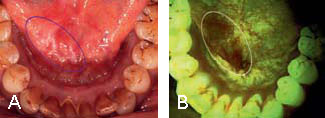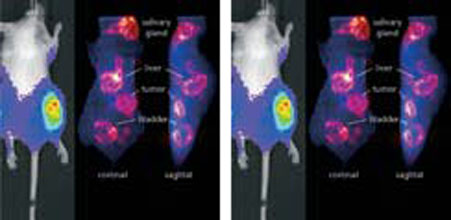The Canadian Cancer Society Research Institute (formerly the National Cancer Institute of Canada) has been operating under its new name since February 2009, but that does not make it any easier to win their awards. The success rate of getting one of their Canada-wide grants is just 17 percent. UBC Dentistry researchers Drs. Catherine Poh and Chris Overall have received two out of the four grants awarded to UBC this year.
Dr. Catherine Poh Awarded Research Grant to Study Management of High-Risk Oral Precancers

A. An ill-defined white lesion on the right anterior floor of the mouth (oval).
B. The same lesion, viewed with a fluorescence visualization device, showing well-demarcated, dark non-fluorescent areas (oval).
Just over $300,000 has been allocated over three-years for Dr. Catherine Poh for her research titled “Characterization of Clonal Alterations Within Novel Fluorescence Visualization (FV) Fields of High-Risk Oral Premalignant Lesions.” Poh points out that more than 300,000 new cases of oral cancer are reported each year worldwide, with half of the individuals dying of the disease. The solution is early detection and effective treatment of high-risk oral precancers.
Poh’s research will entail working with a new hand-held optical tool that helps clinicians identify oral lesions that are not obvious in clinical observation, but which have a high chance of becoming cancer. Poh explains the optimism of her research: “We will, for the first time [in a study], take this tool to the operating room to help surgeons check and mark the extent of high-risk change around oral lesions that are not apparent to the surgeons’ eyes. And, hopefully, all the high-risk change can be removed in one surgery.”
She will also use pathology and molecular markers to examine the surgical field. Improved molecular technology provides an opportunity for insight into the biology associated with these high-risk lesions and may provide critical information for targeted drug therapy in cancer prevention. Says Poh, “The results from this research can help us develop more effective strategies to better manage high-risk oral precancers. Through better control of these lesions, improved survival rates and reduction of suffering from oral cancer can be achieved.”
Dr. Chris Overall Receives Five-Year Research Grant Totalling $552k to Study Cancer Proteomics
Dr. Chris Overall’s proposal, titled “Cancer Protease Proteomics: Metadegradomics,” suggests taking the degradomic techniques devised in his lab for evaluating cell systems and using them to study, in cancer, how proteases (enzymes that digest proteins into smaller pieces) work and which proteins are acted upon by the proteases. Degradomics is a highly specialized field of biochemistry that uses global approaches to study the makeup of all proteins in a tissue. “Metadegradomics” is what Overall calls the study of all proteases that are working on all proteins present in whole cancers in tissues.

PET image of a mouse
“We want to study two medically important cancers—skin and pancreatic—using mice as models,” he explains. “We plan to look at members of two families of enzymes that are important in cancer, matrix metalloproteinases (MMPs) and cathepsins.” Finding the proteins that are broken down at various stages of cancer in the body can help work out which pathways help the cancer and which are important for normal cells.
Looking ahead, Overall is hopeful that once he has a cohort of proteins to target and knows which proteins must be protected from drugs (anti-targets), he and his team can use this information to help design drugs to provide new cancer treatments. “The findings from this study will give rise to more effective therapies,” he says, “and we might also be able to follow some of the newly identified proteins as markers to see how the cancer is progressing.”